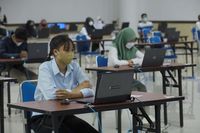In a surprising twist during the 2025 Ujian Tertulis Berbasis Komputer Seleksi Nasional Berdasarkan Tes (UTBK SNBT), students encountered science-related terms in the Indonesian Language Literacy (LBI) subtest, leading to widespread complaints, particularly among those specializing in social sciences. This unexpected inclusion has raised questions about the nature of the test and its alignment with students' academic backgrounds.
Eduart Wolok, the Head of the National Selection Committee for New Student Admissions (SNPMB), addressed these concerns on April 29, 2025, during a discussion on the SNPMB YouTube channel. He clarified that the LBI subtest is designed to evaluate students' literacy skills, not merely their proficiency in the Indonesian language. "We have made it clear that the test is about Literacy in Indonesian, not just Indonesian language knowledge," he stated. This distinction has led to misunderstandings among participants, who expected the test to focus solely on language skills.
Many students, including Rivia, a participant at the University of Indonesia (UI), expressed frustration over the test's content. Having taken the exam on May 24, 2025, Rivia found the inclusion of scientific terminology, such as chemical compounds, particularly challenging. "LBI now seems more difficult," she remarked, highlighting her struggle with questions that incorporated terms from the natural sciences. This sentiment was echoed by Nida, another participant, who noted that the test was more challenging than she anticipated due to the unfamiliarity of the chemical terms presented.
Eduart emphasized that the LBI subtest aims to assess comprehension skills rather than specific subject knowledge. He explained, "The literacy test evaluates how well participants understand the questions, and it is possible for the science and technology content to be included as part of the literacy assessment." This approach is intended to gauge students' abilities to interpret and analyze various types of texts, including those that may not align with their primary field of study.
Students have reported feeling unprepared for this aspect of the LBI, particularly those from social science backgrounds, who typically do not engage with scientific terminology in their studies. Rivia shared her experience, stating, "If you’re coming from a science background, you’re probably more accustomed to these types of questions." Nida, who described her educational experience as balanced between social and natural sciences, admitted she was caught off guard by the presence of chemical compounds in the exam. "I was surprised to see questions about compounds that I hadn't learned about in school," she said.
This situation has sparked a broader discussion about the format and expectations of the UTBK SNBT. Eduart reiterated that the guidelines for the test were communicated clearly, stating, "We never mentioned that the LBI would solely consist of Indonesian language material. It is a literacy test that includes various subjects to assess overall comprehension skills." He further clarified that the test does not focus exclusively on language proficiency, which has been a point of confusion for many students.
The complaints from UTBK participants underscore the need for clarity in the testing process and the materials covered. Many students are left questioning how well their educational backgrounds prepare them for such assessments, especially when faced with content that seems outside their expertise. Eduart's comments suggest an ongoing effort to refine the testing process and ensure that students are adequately informed about what to expect.
As the discussions continue, it remains to be seen how the SNPMB will address these concerns moving forward. The inclusion of science-related terms in the LBI subtest has prompted calls for better alignment between test content and students' academic experiences. Ensuring that all participants feel prepared and confident in their abilities is essential for the integrity of the admissions process.
In conclusion, the unexpected challenges faced by students in the 2025 UTBK SNBT highlight the importance of clear communication and alignment between testing materials and students' educational backgrounds. As students like Rivia and Nida navigate these complexities, the SNPMB's response will be crucial in shaping the future of the admissions testing landscape in Indonesia.




